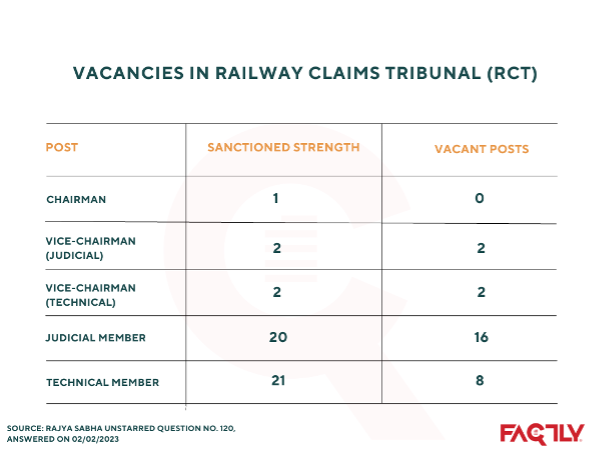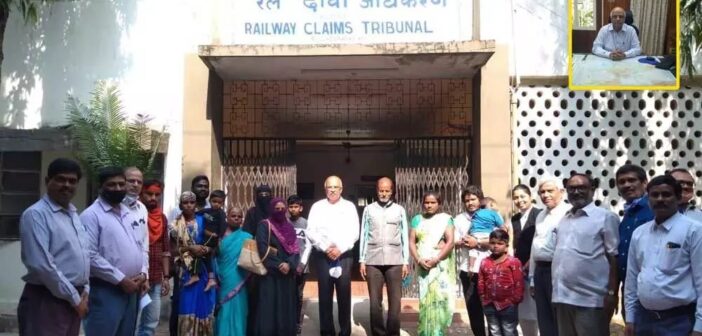Data from the Indian Railways indicates that while the number of claims related to goods/luggage/parcel reduced significantly in the last two decades, the compensation amount increased. Data also indicates high number of vacancies in Railway Claim Tribunals.
In the earlier parts of the series on railway accidents, we looked at the consequential accidents and the process of claims and compensation terms. In this third part of the series, the focus is on the functioning of the Railway Claims Tribunal, the number of claims raised, and the amount of compensation paid by Indian Railways for different types of incidents.
60% of the sanctioned strength is vacant in Railway Claims Tribunal
As highlighted in the earlier story, any application for compensation is to be made to the Railway Claim Tribunal (RCT) which decides on the merits of the application not just based on the Code of Civil Procedure, but also guided by the principles of natural justice. RCT plays a key role in ensuring relief to rail users by way of expeditious payment of compensation to the victims of rail accidents and to those whose goods are lost or damaged in rail transit.
However, the data on the functioning of RCT provides a contrasting picture. As of February 2023, a total of 28 posts are lying vacant out of the total 46 sanctioned strength of Chairman/President and other adjudicating Members of the Tribunals. In other words, more than 60% of posts in RCT are lying vacant. Apart from this, there were 225 vacancies of staff in the Railway Claims Tribunal as of 28 February 2022.

High backlog of cases in Railway Tribunal
Reduction in the number of claims cases and amount paid towards compensation is an important determinant of customer satisfaction and efficiency of the working of the RCTs. The data on pending cases with RCT indicate that there is a high backlog of cases pending with different benches of the RCT. As per the information provided in the parliament on various occasions, there has been a decline in the pendency of cases. However, the absolute number still remains high.
The average time taken in disposal of cases is nearly 4 years as per a parliamentary response provided by the Government in 2018. This was also highlighted in our earlier story on Railway Tribunals. Some commonly cited reasons for such a long delay in resolution are filing of written statements, summoning of witness, arguments, and adjournment sought by the contestants for producing evidence, cross-examination of claimant’s documentary evidence, and vacancies in RCT among others.
84% decline in the claims for goods/luggage/parcel in last ten years
Railway claims and compensation can be for two broad different scenarios –
- loss of goods/luggage/parcel, and
- for any untoward incidents/accidents.
Railway Administration is liable to pay compensation to rail passengers only when a decree is awarded by the RCT in favour of the claimant. The data on the number of claim cases show that the claims have reduced substantially over the last ten years. As against 20,800 number of cases received in 2009-10, only 3401 cases were registered in 2021-22, reflecting a drop of 84%. However, the amount paid as compensation has increased during the same period. It rose from Rs. 14 crores in 2009-10 to Rs. 84 crores in 2020-21. This is the highest compensation paid during the last ten years. During 2021-22, the compensation paid declined to Rs. 28.6 crores.
The average compensation paid per claim also grew from Rs. 0.26 lakh in 2009-10 to Rs. 31.58 lahks in 2020-21, thereafter which it declined to Rs. 14.76 lahks during 2021-22.
Drop in compensation paid for death and injuries.
The amount of compensation payable in respect of death and injuries has been specified vide schedule in Railway Accidents and Untoward Incidents (Compensation) Rules 2016. The compensation could range from Rs. 64,000 to Rs. 8 lakhs depending on the grievousness of the injuries and loss of life.
From 2012-13 to 2021-22, a total of 509 people were killed and 1528 people were injured in train accidents or untoward incidents. The casualties per million passengers travelled remained unchanged at 0.03 in 2021-22 from 2020-21.
The data for the compensation paid to the victims of train accidents or untoward incidents point out the fall in the compensation paid possibly because of the reduction in accidents & casualties. It was Rs. 320 lakhs during 2012-13, post which the compensation remained below this figure till 207-18. In 2018-19, the compensation paid jumped to Rs. 641 lakhs, the highest ever in the last ten years. Since 2018-19, the amount of compensation paid declined gradually, settling at Rs. 86 lakhs in 2021-22.



